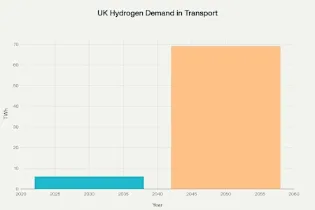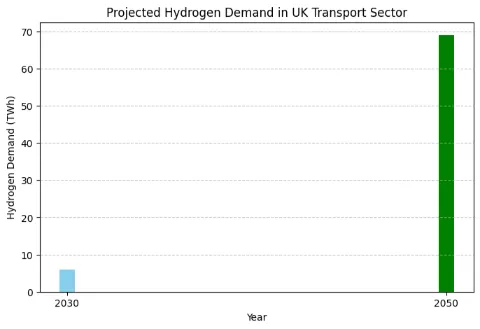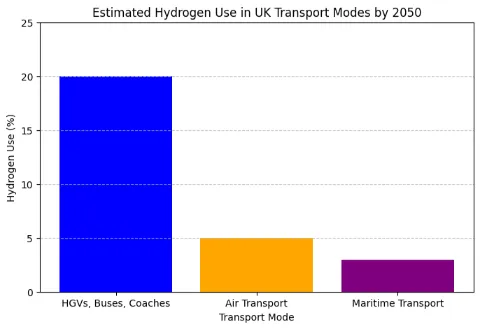

Integrating Hydrogen Fuels UK with Renewable Energy for Sustainable Transport Solutions
Hydrogen fuels in the UK are increasingly combined with renewable energy sources to create sustainable transport solutions that support the UK’s net-zero goals. This combination takes advantage of the strengths of both hydrogen and renewables, allowing for the decarbonisation of transport while improving energy security and promoting economic growth.
The Role of Renewable Energy in Hydrogen Production
Green hydrogen, produced through electrolysis powered by renewable electricity like offshore wind and solar, is key to the UK’s hydrogen strategy. The government aims to reach up to 10 GW of low-carbon hydrogen production capacity by 2030, with at least half coming from green hydrogen. This requires a significant increase in renewable generation, especially offshore wind, with estimates suggesting we need an additional 10 GW of renewables to support hydrogen production.
Benefits of Integrating Hydrogen with Renewables for Transport
Zero-Emission Fuel Supply
Using renewable electricity to produce hydrogen means that hydrogen fuels in the UK are genuinely low-carbon. This enables zero-emission transport solutions for everything from passenger vehicles to heavy goods transport and aviation.
Energy Storage and Grid Balancing
Hydrogen serves as a long-duration energy storage solution, absorbing excess renewable energy during periods of high generation and low demand. This stored energy can then power hydrogen vehicles, helping to balance the grid and maximize the use of renewables.
Decarbonising Hard-to-Abate Sectors
Hydrogen made from renewables is vital for sectors where direct electrification is hard, such as heavy-duty trucks, buses, maritime, and aviation. This enables sustainable transport solutions across various industries.
Energy Security
By producing hydrogen from domestic renewable sources, the UK reduces its dependence on imported fossil fuels and strengthens its energy independence while creating local jobs.
Strategic Projects and Investments
The UK government’s Second Hydrogen Allocation Round (HAR2) has shortlisted 27 projects in 2025 that support low-carbon hydrogen production, many of which use renewable energy to produce green hydrogen for transport and industry. These projects are expected to bring in over £1 billion in private investment by 2029 and create thousands of jobs in manufacturing communities.
Learn about innovative hydrogen transport projects like the HydroFLEX train and the future of hydrogen trains in the UK.
Economic and Environmental Impact
Emissions Reduction
The integration of hydrogen with renewables could lead to emissions savings equal to the carbon captured by 700 million trees between 2023 and 2032.
Cost Savings
Hydrogen-enabled transport and power systems are projected to save between £13 billion and £24 billion from 2030 to 2050 by providing flexible, low-cost energy storage and generation.
Job Creation
The UK’s hydrogen sector could create up to 9,000 jobs and attract £4 billion in private investment by 2030, boosting regional economic growth and energy security.
Challenges and the Road Ahead
Scaling green hydrogen production requires coordinated growth of renewable capacity, electrolyser infrastructure, and transport refuelling networks. Strategic planning must ensure the development of storage solutions and hydrogen transport infrastructure to connect production sites with users.
Key challenges include:
- Aligning renewable energy expansion with hydrogen production needs
- Developing cost-effective electrolysis technologies
- Building out hydrogen refuelling infrastructure nationwide
- Creating market mechanisms to support the green hydrogen economy
Conclusion
Combining hydrogen fuels in the UK with renewable energy is essential for a sustainable transport future. By producing green hydrogen from abundant renewable resources, the UK can power a wide array of zero-emission vehicles, balance its energy system, and drive economic growth while fulfilling its climate commitments. With continued investment and strategic planning, this integrated approach will play a crucial role in achieving the UK’s net-zero targets and establishing a clean energy economy.

- Processes | MDPI: Article 11(9):2730 – Peer-reviewed research article from MDPI’s Processes journal.
- Hydrogen vehicles and mobility | Allianz UK – Insightful overview of hydrogen as an energy carrier and its role in mobility and transport sectors.